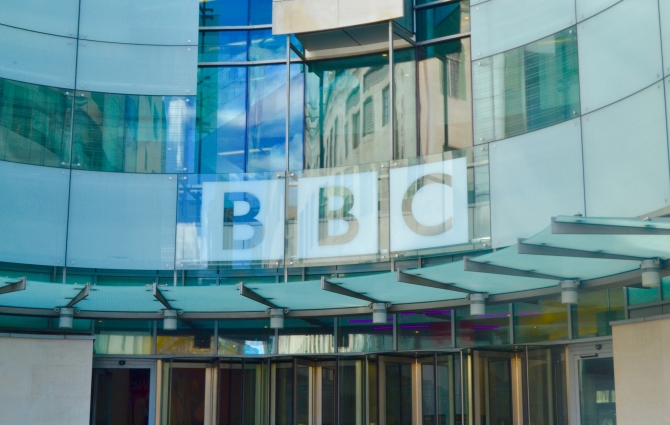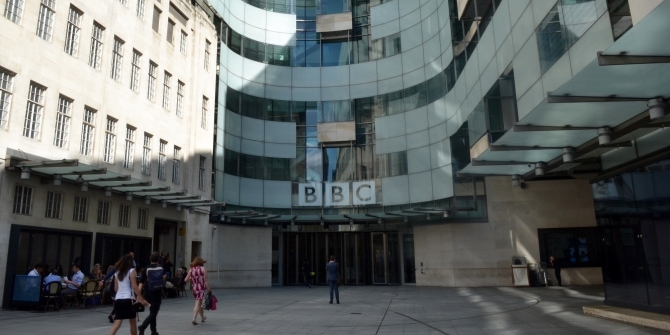 But that won’t happen with the Tories in power and beholden to right–wing media barons, argues Professor Bart Cammaerts, Head of LSE’s Department of Media and Communications. In advance of our public event on 2 March, where BBC Director General Tim Davie will speak about ‘Public Service Broadcasting in its Second Century,’ Bart explains why the debate about BBC funding needs to be seen as distinct from the debate about its legitimacy as a public service media provider.
But that won’t happen with the Tories in power and beholden to right–wing media barons, argues Professor Bart Cammaerts, Head of LSE’s Department of Media and Communications. In advance of our public event on 2 March, where BBC Director General Tim Davie will speak about ‘Public Service Broadcasting in its Second Century,’ Bart explains why the debate about BBC funding needs to be seen as distinct from the debate about its legitimacy as a public service media provider.
The announcement from UK Digital, Culture, Media and Sport Secretary of State Nadine Dorries that the government is considering abolishing the licence fee in the coming years is a typical example of a populist politics of provocation: saying something deliberately transgressive, waiting for the liberal defensive backlash and consternation in the form of interviews, opinion pieces, public statements, blog posts, YouTube videos, etc. and then subsequently backtracking (somewhat).
A debate on the licence fee is always going to engender strong options and feelings as it is tied to the funding of one of – if not the most – valued British public institutions, both within the UK and beyond. The BBC is a very strong global brand; it is one of the few British institutions that still has this global reach and prestige as it is seen across the world as producing quality drama, witty humour and excellent trustworthy journalism. I personally remember, as a young teenager growing up in Central Africa, listening intensely and attentively to a crackling BBC World Service on shortwave radio. For all its faults, it was often the sole source of trustworthy information and news in that part of the world.
The precise way that public service broadcasters (PSBs) are funded exhibits a great deal of differentiation across Europe, but one thing is for sure: the debate about how to fund PSBs should never be muddled by a debate about the legitimacy and the need for adequate funding of PSBs. However, these two distinct questions all too often get conflated in the UK when it comes to the BBC. The reason for this is that the political forces out to destroy the BBC – or at the very least clip its wings – are in power now, which makes any debate about how to finance the BBC also a debate about its very existence.
If it were possible to separate these two debates (i.e. legitimacy to exist and be funded properly on the one hand, and the way that that funding is organised on the other hand), a less political debate about how to fund the BBC might emerge. Such a broader debate could also consider other media initiatives with public value, such as community radio and investigative journalism projects, because as far as I’m concerned, public service media is about much more than just the BBC.
There are a wide variety of funding models out there, but a licence fee is seen by many as an outdated and a-social model that requires a far too repressive and costly regime to ensure that everyone pays the fee. For many years, I have argued (see here and here) that a licence fee basically amounts to a deeply unfair flat tax which hits the poor, the disadvantaged and now also the elderly disproportionally hard, both financially but also in terms of the oppressive enforcement and the criminalisation of those that do not comply. It would, in my view, be much fairer and more efficient to fund the BBC out of general taxation which is progressive, meaning that those who earn more would also contribute more to the funding of public service media. An additional source of funding for public service media might also come from an intra-sectorial tax on the advertising revenue of commercial media as is the case in some countries (France for instance).
However, as I indicated above, as long as there is no agreement at a political level that independent and publicly funded public service media are quintessential for a democratic and diverse media landscape, it is also difficult – if not impossible – to have this important debate regarding funding models in a serene climate: the debate about changing the way public service media are being funded gets entangled with a more existential debate about the legitimacy of having taxpayer funded public service media in the first place. Furthermore, as long as commercial media barons such as the Murdochs and Viscount Rothermeres of this world are allowed to yield their enormous lobbying power on British politics in an unfettered manner, the separation of these debates, in spite of high public support for public service media, will just not happen, as this strategic conflation precisely suits their commercial as well as political interests.
This article gives the views of the author and does not represent the position of the Media@LSE blog, nor of the London School of Economics and Political Science.
Featured image: Photo by K. Mitch Hodge on Unsplash





